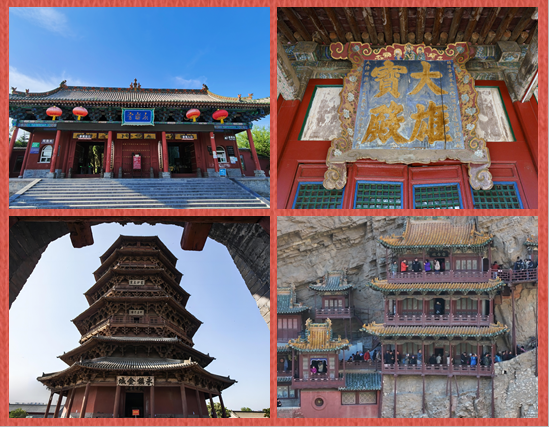Spirit of superhero endures on stage
Opera star Wu Lingyun is renowned for his longtime portrayal of icon Guan Yu
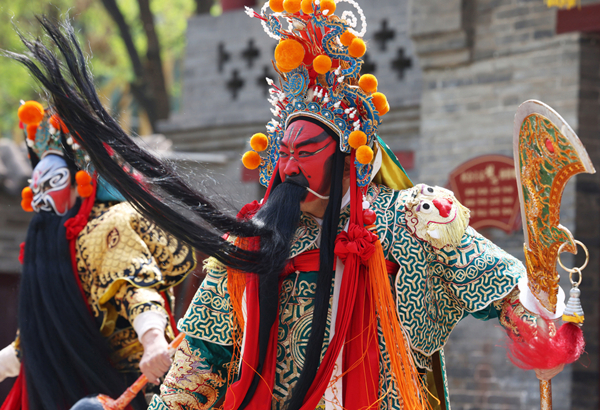
Wu (right) plays Guan Yu in a performance staged at the temple on April 22. ZHU XINGXIN/CHINA DAILY
In Chinese folklore, Guan Yu, a general from the late Eastern Han Dynasty (25-220) also known as "Guan Gong" or "Guan Di", stands as a revered figure. The "God of War" is perceived as a superhero in the eyes of the Chinese people.
For over 40 years, Wu Lingyun, a Shanxi Opera (or jinju) performer and a renowned inheritor of the intangible cultural heritage, has played Guan on stage, further popularizing the art with his portrayals of the iconic figure.
As China celebrated Cultural and Natural Heritage Day on Saturday, Wu, who is also vice-president of the Jinju Art Research Institute in Taiyuan, Shanxi province, told China Daily that he is proud to be able to perform as the general.
"Guan Yu, renowned for his loyalty, righteousness, benevolence and valor, symbolizes the spirit of the Chinese nation and is beloved by people worldwide," he said.
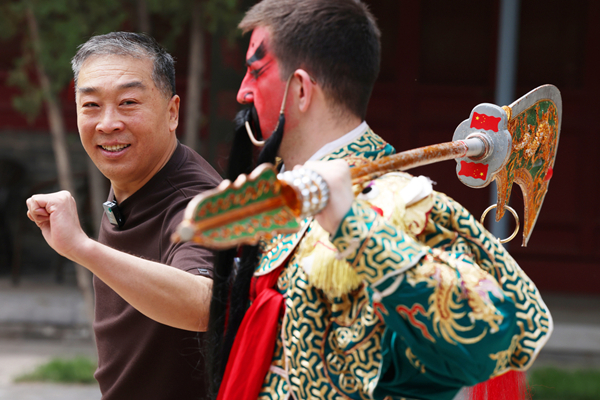
Wu (left) teaches movements to a student from the United States at the temple on April 22. ZHU XINGXIN/CHINA DAILY
Originating from the central areas of Shanxi, jinju boasts a rich vocal style and melodious tunes that have evolved over time to create a unique art. In 2006, it was recognized as one of the first national intangible cultural heritages.
Wu began his theatrical journey at age 8 and joined a troupe when he was 12, following in the footsteps of his parents, Wu Zhong and Yan Huizhen, both esteemed jinju artists. In 1982, his parents brought Guan's story to the jinju stage, with his mother becoming the first female performer to portray the general in the history of Chinese opera.
"The presence of Guan Yu in jinju originated from my parents," Wu said.
"I am the second generation of Guan Yu performers in our family. My father always emphasized emulating Guan Yu's virtues, to be the person that he was, in order to embody his spirit on the stage."
Wu began portraying Guan in 1985, when he was 20 years old. His performances gained acclaim, leading him to win the 17th China Drama Plum Blossom Award in 1999.
"I began portraying Guan Yu at age 20 and now, at the age of 60, I am retiring," he said. "When I embody the general now, even my eyebrows naturally raise, striving to capture every detail in pursuit of his spirit. Sometimes, I find myself unable to sleep and begin reciting lines," he said.
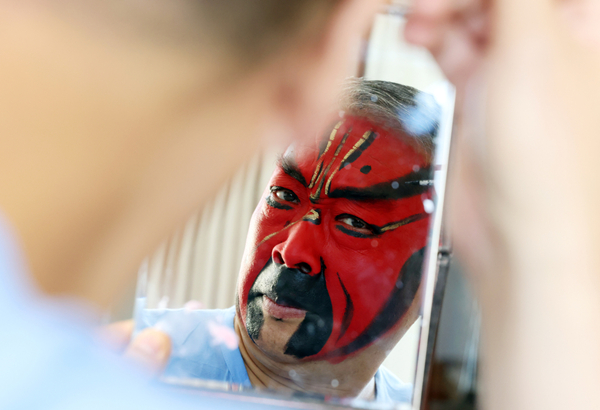
Wu paints the mask of Guan Yu at the primary school on May 27. ZHU XINGXIN/CHINA DAILY
There are over 30,000 temples and guilds honoring Guan worldwide, with the legendary general's cultural influence spanning 168 countries and regions.
In Wu's eyes, Guan's defining characteristics are loyalty and integrity.
To portray Guan authentically, Wu visited thousands of temples, observed and recorded the details of statues depicting the general and incorporated the depictions into his performances.
He also read history books about the general and watched portrayals of him by older opera artists, drawing inspiration from them.
During a performance in Southeast Asia, Wu, performing as Guan, made a heart gesture to the audience during a curtain call.
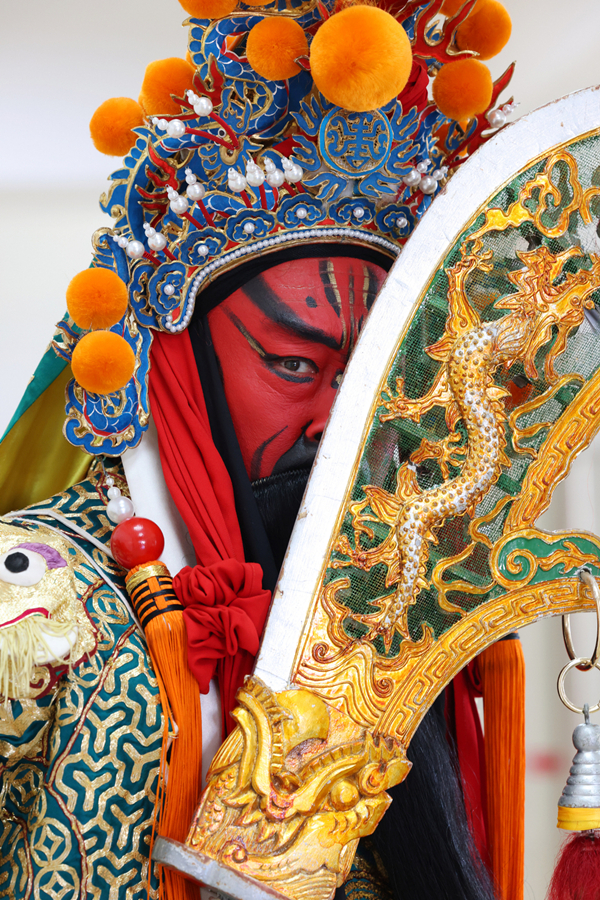
Wu plays Guan Yu in a performance at the primary school on May 27. ZHU XINGXIN/CHINA DAILY
A short video showing the gesture went viral online.
"Audiences overseas come from diverse backgrounds with different languages and cultures. So I thought of using the universal language of the heart gesture to show a different face of Guan Yu in the modern era," Wu said.
"I am an active Guan Yu on the stage. My greatest responsibility now is to pass on and promote the artistic charm of traditional jinju through various means. This is my mission and my driving force," he added.
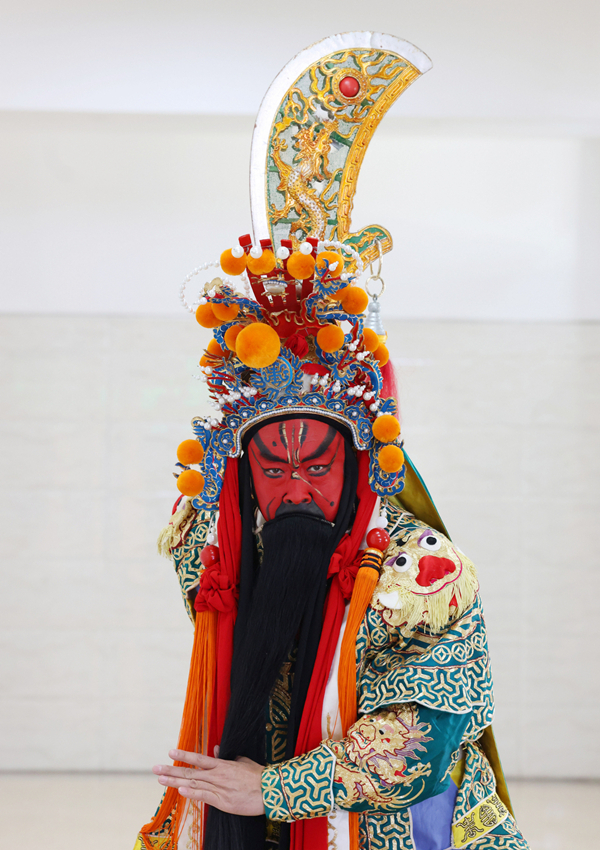
Guan Yu played by Wu Lingyun. ZHU XINGXIN/CHINA DAILY
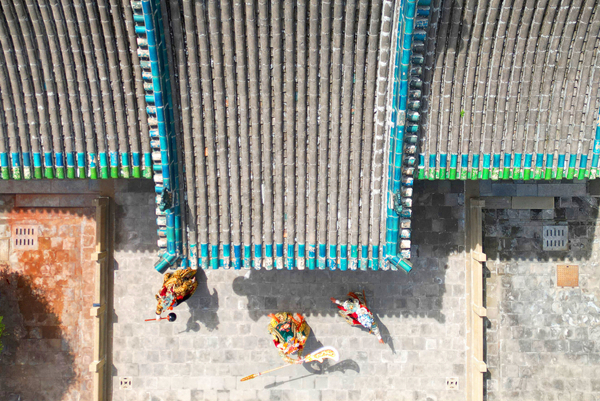
Wu Lingyun (middle) and his colleagues stage a performance at Grand Guan Di Temple in Taiyuan, Shanxi province, on April 22. ZHU XINGXIN/CHINA DAILY

